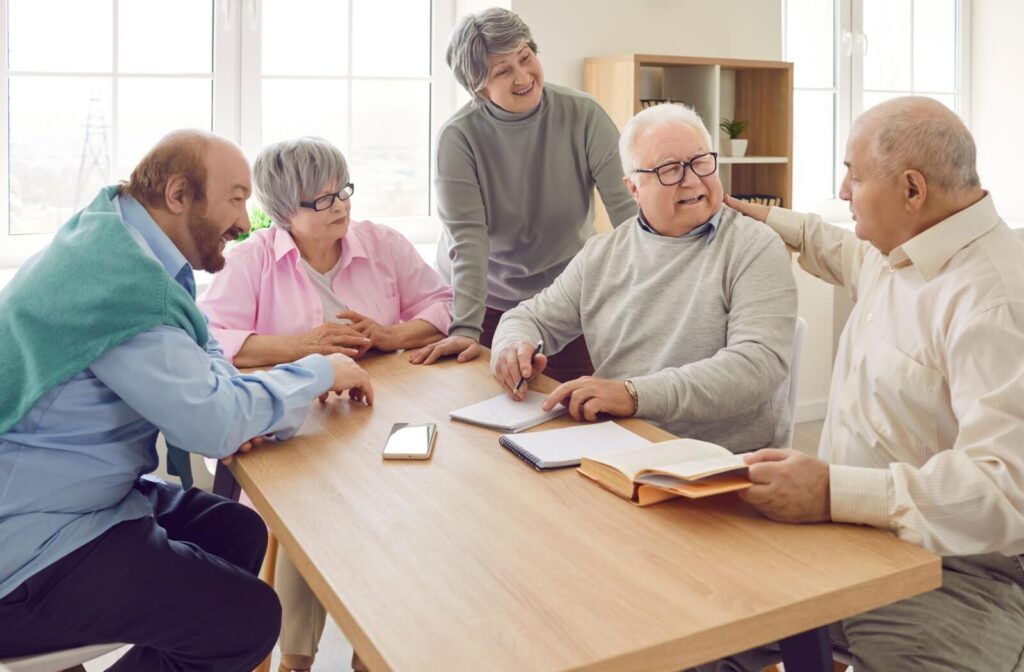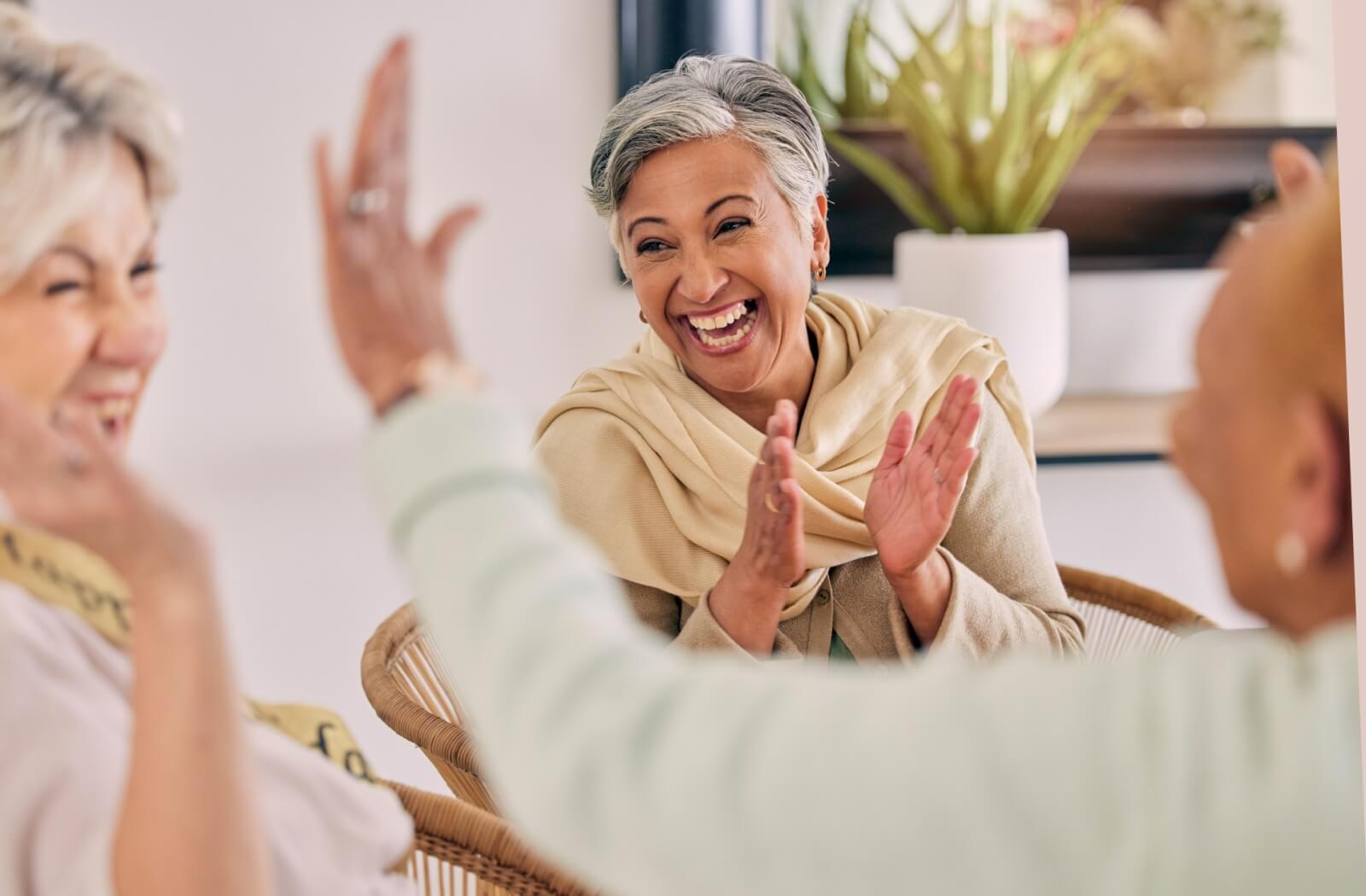Staying connected with others is more than just a way to pass the time—it’s a powerful tool for supporting brain health. For many, maintaining cognitive function is a priority, and engaging with peers can play a meaningful role in this journey. Social interactions can help keep the mind sharp, lift our spirits, and provide a sense of connection, all of which contribute to overall well-being.
So, how does being social help your memory? Engaging with peers supports memory retention by keeping your mind active, reducing stress, and providing a sense of purpose through shared experiences. A vibrant social life can be one of the most enjoyable ways to nurture your cognitive health.
Key Takeaways
- Social Interaction Boosts Cognitive Health: Engaging with peers keeps the mind active, reduces stress, and provides a sense of purpose, all of which support memory retention and overall brain health.
- Conversations Exercise the Brain: Simple conversations require listening, processing, and recalling information, which naturally stimulate cognitive functions and help maintain mental sharpness.
- Shared Experiences Strengthen Memory: Recalling and sharing stories with others reinforces memory pathways, making it easier to access those memories later while fostering a sense of connection and belonging.
- Group Activities Enhance Memory Retention: Activities such as games, book clubs, and learning new skills combine mental stimulation with social engagement, creating enjoyable ways to support memory and overall well-being.
- A Supportive Community Makes a Difference: Being part of a positive social environment, such as a senior living community, can reduce loneliness, improve mood, and provide daily opportunities for meaningful connections.
The Link Between Socializing and Memory
Think of socializing as a workout for your brain. When you’re with friends, you’re not just having a pleasant chat–you’re actually boosting thinking skills, memory, and health. A simple conversation requires you to listen, process what’s being said, and recall information to form a reply. This back-and-forth is a natural way to exercise your cognitive functions. It encourages your brain to stay nimble and active.
Sharing Stories and Experiences
Recalling and sharing memories with others helps strengthen the pathways in your brain associated with those memories. Each time you tell a story from your past, you are practicing retrieval, which can make it easier to access those memories later. This is often a part of daily life in supportive settings, such as assisted living or communities that offer specialized memory care.
Positive Effects of Peer Relationships on Well-Being
Your emotional state and cognitive health are closely connected. A positive and supportive social environment can help reduce stress and foster a sense of well-being and happiness.
A Sense of Belonging and Purpose
Being part of a group and forming friendships can provide a strong sense of purpose and belonging. Feeling connected to others can reduce feelings of loneliness and isolation. This, in turn, supports mental clarity and a positive outlook on life.
Reduced Stress and Improved Mood
Laughing with a friend or enjoying a heartfelt conversation can be a fantastic way to brighten your day. These positive social interactions can help lower stress levels. When you feel happy and relaxed, your brain is better equipped to form and retain memories.
How Group Activities Promote Memory Retention
Participating in activities with others combines the benefits of mental stimulation and social connection. Structured programs, often found in assisted living and memory care settings, are designed to create these opportunities for engagement. They make exercising your memory fun and social.
- Learning a new skill together: Taking a class in painting or learning a new language encourages you to absorb new information and practice it with others. Explain a step to a classmate, and it can reinforce your own learning.
- Playing games and solving puzzles: Many games, from cards to board games, require you to remember rules, think strategically, and interact with fellow players. They offer a fun way to keep your mind sharp.
- Book clubs and discussion groups: Talking about a book or a current event with a group challenges you to recall details, organize your thoughts, and consider different perspectives. This active discussion helps solidify information in your mind.
- Enjoying music or art: Listening to music from the past or creating art together can evoke powerful memories and emotions. In fact, the National Institute on Aging suggests that participating in the arts can create paths to healthy aging. These shared experiences create new, positive memories while connecting you with others.

Finding Opportunities for Social Engagement
Creating a socially active lifestyle is a decisive step you can take for yourself or your loved one. There are many ways to build and maintain social connections. It’s all about finding what feels right for you.
Connecting with Friends and Family
Regular calls, visits, and outings with loved ones are a cornerstone of a strong social network. These familiar connections provide comfort and create opportunities for joyful shared experiences. Scheduling regular get-togethers can give you something to look forward to.
Exploring Local Community Groups
Local community centers, clubs, and volunteer organizations offer excellent ways to meet new people who share similar interests. Joining a group can add structure and anticipation to your weekly schedule. It’s a great way to branch out and try something new.
Considering a Senior Living Community
A senior living community offers a vibrant environment with built-in opportunities for daily social interaction. With organized activities, communal dining, and shared spaces, making connections becomes a natural part of everyday life. Options like assisted living provide support while encouraging independence, and specialized memory care programs focus on engaging residents in a safe, social setting. Even short-term respite care can provide a welcome social boost.
A Supportive Community Can Make a Difference
At All American Assisted Living at Washington Township, we believe in the power of community and friendship. We create a welcoming environment where these connections flourish every day, helping residents feel at home and live a fulfilling life. We invite you to see it for yourself.
Contact us today to schedule a friendly tour and discover more about our vibrant senior living community. We’d love to show you how we can help you or your loved one thrive. We look forward to meeting you!


